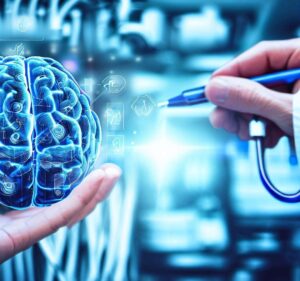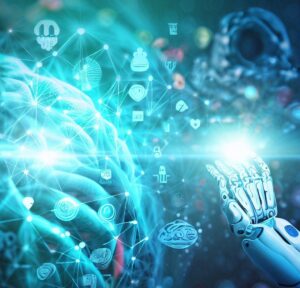Deep learning, a subfield of artificial intelligence, has been increasingly utilized in healthcare, particularly in radiology imaging. Utilizing sophisticated algorithms to analyze medical images, deep learning is capable of discerning intricate subtleties in radiographic images that can often elude the human eye. This advanced technology has been instrumental in the development of algorithms that can pinpoint with accuracy the presence of lung cancer in computed tomography (CT) scans. Due to the early detection facilitated by these algorithms, patients have increased chances of survival, making this a potentially life-saving application.

Deep learning algorithms have significantly impacted the capability to predict diseases. By constructing predictive models with deep learning, a wide multitude of health-related data points can be scrutinized. The algorithms can anticipate the probability of a patient developing chronic diseases such as diabetes or heart diseases, occasionally prior to the onset of any detectable symptoms. This means that patients can begin preventative treatments sooner, greatly improving their prognosis.
In terms of personalized treatment, deep learning has made momentous advancements. The technology’s complex algorithms can incorporate a myriad of personal factors, such as individual’s genetic makeup, lifestyle behaviors, and more, to formulate treatment plans that are custom-tailored to each patient. This highly personalized approach has found considerable use in oncology, with cancer treatments being tailored based on each patient’s unique genetic and physiological profile. This leads to a more effective and suitable treatment regimen, improving the overall outcomes and patient’s quality of life.
Also, deep learning’s application has breached the domain of drug discovery and medical research, accelerating the speed at which beneficial medications are brought to market. It facilitates the prediction of the success rate of certain drug compositions, which expedites trials and overall research process. Remarkable examples of its use include the discovery of novel drug molecules and predicting how these will interact with the human body.
Electronic Health Records (EHR) are benefitting from the predictive analytics capabilities of deep learning. Essentially, algorithms are employed to comb through extensive data sets of patient records, pinpointing patterns that can indicate potential patient health risks. Such use of deep learning improves the accuracy of diagnoses and the effectiveness of subsequent treatments, thereby enhancing the overall healthcare process. The fusion of deep learning with EHR not only enhances the efficiency of the healthcare system but also supports a preventative approach to health, possibly revolutionizing personal healthcare management.
Challenges of Implementing Deep Learning in Healthcare
Implementing deep learning in the healthcare sector, despite its vast potential, does face significant challenges.
The black box nature of deep learning models makes it hard to interpret how the algorithms reach particular outcomes or predictions. While these models can process large amounts of complex data and generate predictive insights, it is often obscure as to how they achieved those results. This lack of transparency can lead to uncertainty and misinterpretations. Ideally, clinicians who use results generated by these models for diagnosis or treatment planning would have a clear understanding of their underlying mechanisms, to thoroughly confirm their reliability and accuracy.
 Deep learning applications in healthcare often require large amounts of sensitive patient data to train the algorithms. This raises important issues about data security, patient privacy, and ethical usage of data. There are stringent regulations around personal health information to ensure the privacy and security of individuals. It can be challenging to navigate these while attempting to leverage vast amounts of patient data for deep learning models.
Deep learning applications in healthcare often require large amounts of sensitive patient data to train the algorithms. This raises important issues about data security, patient privacy, and ethical usage of data. There are stringent regulations around personal health information to ensure the privacy and security of individuals. It can be challenging to navigate these while attempting to leverage vast amounts of patient data for deep learning models.
Main challenge is the adoption and trust by healthcare professionals. Despite being an advanced technology, the integration of deep learning into regular medical practice requires a significant change in the traditional approach to healthcare.
Clinicians need to trust the recommendations produced by these algorithms, especially when critical health decisions are made based on them. Yet, their trust can be hindered due to the lack of interpretability or past experiences with less sophisticated models. While deep learning possesses drastically transformative potential, it also requires substantial computational power and specific technical skill sets to develop and manage the algorithms. The resource-intensive nature and the scarcity of such expertise in traditional healthcare institutions can be a barrier to implementing deep learning solutions.
The potential benefits of utilizing deep learning in healthcare are substantial. A pivotal solution to these challenges is to establish clearer guidelines and regulations regarding the application of AI in healthcare, extensive training for medical professionals in understanding and interpreting AI models, and creating robust security measures to ensure data privacy.
The Future of Deep Learning in Healthcare
Despite the challenges associated with implementing deep learning in healthcare, its potential for further integration and expansion remains vast. Numerous advancements are within our grasp, aided by improvements in computational capacities and ongoing progress in artificial intelligence.
Research is actively being conducted with an objective to devise algorithms capable of forecasting disease outbreaks. Such predictive models could be invaluable in managing future health crises, allowing for better preparation and potentially mitigating the effects of such outbreaks. Looking ahead, the projection of deep learning in healthcare is robust and promising.As these technologies continue to evolve, we can expect deep learning to increasingly while becoming integral to the healthcare infrastructure. Its role in diagnosing conditions, predicting disease progression, and tailoring personalized treatment plans will become progressively refined.
With constant advancements unfolding in this sphere, the day is not far when deep learning is intricately interwoven throughout healthcare. The advent of this technology has the potential to revolutionize medicine, enhancing medical care delivery and outcomes, reducing healthcare costs, and, most importantly, significantly improving and even saving countless human lives.